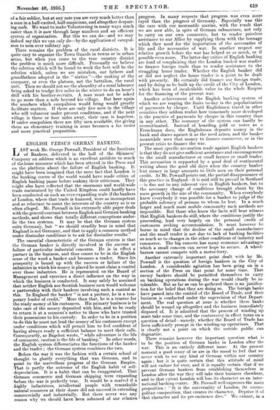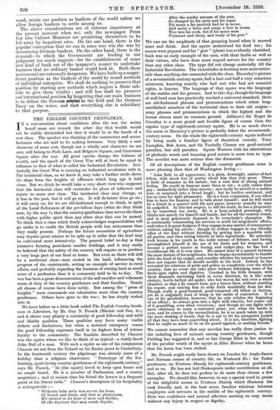ENGLISH VERSUS GERMAN BANKING.
AST week Mr. George Pownall, President of the Institute of Bankers, delivered in the hall of the Skinners' Company an address which is an excellent antidote to much of the loose nonsense which has been uttered in the Press and on the platform about the failure of English banking. It might have been imagined that the mere fact that London is the banking centre of the world would have made critics of English banking pause before making their criticisms. They might also have reflected that the enormous and world-wide trade maintained by the United Kingdom could hardly have been conducted on such an ever-expanding scale if the bankers of London, where that trade is financed, were as incompetent and as reluctant to assist the interests of the country as is so often alleged. Mr. Pownall in his extremely able paper deals with the general contrast between English and German banking methods, and shows that totally different conceptions underlie the two systems. It may be that the German system suits Germany, but "we should steadily bear in mind that England is not Germany, and that to apply a common method -under dissimilar conditions is to ask for dissimilar results."
The essential characteristic of the German system is that the German banker is directly involved in the success or failure of particular industrial concerns. He is in effect a partner in the business, and thus ceases to be in the English sense of the word a banker and becomes a trader. Since his prosperity is bound up with the success or failure of the industries in which his money is placed he must claim a control over those industries. He is represented on the Board of Management and exercises a direct influence on the way in which the business is conducted. It may safely be assumed that neither English nor Scottish business men would welcome a partnership with their bankers involving such a control as this. In England the banker "is not a partner, he is a temporary lender of credit." More than that, he is a trustee for the ready money of his customers. His primary business is to take care of the money deposited with him, and to be ready to return it at a moment's notice to those who have trusted their possessions to his custody. In order to be in a position to do this he must not lend the money of his customers except under conditions which will permit him to feel confident of having always ready a sufficient balance to meet their calls. Consequently, as Bagehot wrote, "while adventure is the life of commerce, caution is the life of banking." In other words, the English system differentiates the functions of the banker and the trader ; the German system combines the two.
Before the war it was the fashion with a certain school of thought to glorify everything that was German, and to • point to the marvellous progress of the German Empire. .That is partly the outcome of the English habit of self • depreciation. It is a habit that can be exaggerated. That German commerce and German shipping were expanding 'before the war is perfectly true. It would be a marvel if a .highly industrious, intellectual people with remarkable .natural resources at their doors did not succeed in extending commercially and industrially. But there never was any reason why we should have been ashamed of our relative progress. In many respects that progress was even more rapid than the progress of Germany. Especially was this the ease with our mercantile marine, with the result that we are now able, in spite of German submarines, not only to carry on our own commerce, but to render priceless assistance to our Allies by supplying them with the tonnage which they need for the importation of the necessaries of life and the necessaries of war. In another respect our relative growth before the war has helped us as much, or if possible even more. The latter-day critics of English banking are fond of complaining that the London banker was readier to finance foreign trade than to render assistance to the struggling home trader. Whether the English banker did or did not neglect the home trader is a point to be dealt with presently. He certainly did finance our foreign trade, and by doing so he built up the credit of the City of London, which has been of incalculable value to the whole Empire for the financing of the present war.
Another achievement of the English banking system of which we are reaping the fruits to-day is the popularization of payments by cheque. Until Englishmen travel in other countries they seldom realize how immensely more developed is the practice of payments by cheque in this country than in any other. The economy of the system can hardly be overestimated. Instead of hoarding gold or notes 88 a Frenchman does, the Englishman deposits money in the bank and draws against it as the need arises, and the banker meanwhile uses that money to finance commerce, or in the present crisis to finance the war.
The most specific accusation made against English bankers is that they do not give sufficient assistance and encouragement to the small manufacturer or small farmer or small trader. This accusation is supported by a good deal of sentimental writing about the good old days when the country banker lent money in large amounts to little men on their personal credit. As Mr. Pownall points out, the partial disappearance of this practice in England—it is said still to prevail in Scotland —is due not to any inherent vice in English bankers, but to the necessary change of conditions brought about by the mere growth in the size of the community. When everybody knew everybody it was possible for a banker to judge of the probable solvency of persons to whom he lent. In a much larger and much more mobile community such methods are impossible. But those who know the facts will bear witness that English bankers do still, where the conditions justify the proceeding, lend very largely on the personal credit of customers seeking accommodation. It must however be borne in mind that the decline of the small manufacturer and the small trader is not due to lack of banking facilities so much as to changes in the other conditions of industry and commerce. The big concern has many economic advantages which a small concern can never hope to secure. A wheelbarrow cannot compete with a motor-lorry.
Another extremely important point dealt with by Mr. Pownall is the question of foreign bankers in the City of London. A considerable agitation has been going on in a section of the Press on that point for some time. That enemy bankers should be permitted themselves to carry on banking operations during the war would clearly be intolerable. But as far as can be gathered there is no justification for the belief that they are doing so. The foreign banks have paned into the control of the Board of Trade, and their business is conducted under the supervision of that Department. The real question at issue is whether these banks should be wound up altogether and the business immediately disposed of. It is admitted that the process of winding up must take some time, and the controversy in effect turns on a question of detail—namely, whether the Board of Trade has been sufficiently prompt in the winding-up operations. That is clearly not a point on which the outside public can dogmatize. There remains however the important question what is to be the position of German banks in London after the war. This is an entirely different issue. At the present moment a good many of us are in the mood to feel that we never wish to see any kind of German within our country again ; but it is quite certain that this attitude of mind will not endure for ever, and it is equally certain that if we prevent German bankers from establishing themselves in London after the war they will take their business elsewhere, and to that extent London will lose its character as an international banking centre. Mr. Pownall well expresses the main proposition : "It is the universality of London, its cosmopolitan composition, that creates its character. Deprive it of that character and its pre-eminence dies." We cannot, in a word, retain our position as bankers of the world unless we allow foreign bankers to settle among us. The above considerations are of extreme importance at the present moment when not only the newspaper Press but also Cabinet Ministers are permitting themselves to be led away by impatient cries. On the one hand, there is the popular conception that we can in some way win the war by denouncing German bankers. On the other hand, there is the demand—to which the Government are lending in our judgment too much support—for the establishment of some new kind of bank out of the taxpayer's money to undertake business that no ordinary banker would look at. Both these movements are extremely dangerous. We have built up a magnificent position as the bankers of the world by sound methods of individual enterprise. We shall do nothing to preserve that position by starting new methods which require a State subsidy to give them vitality ; and still less shall we preserve our international position by forgetting that our main business is to defeat the German gamin in the field and the German Navy on the water, and that everything else is subsidiary to that purpose.













































 Previous page
Previous page